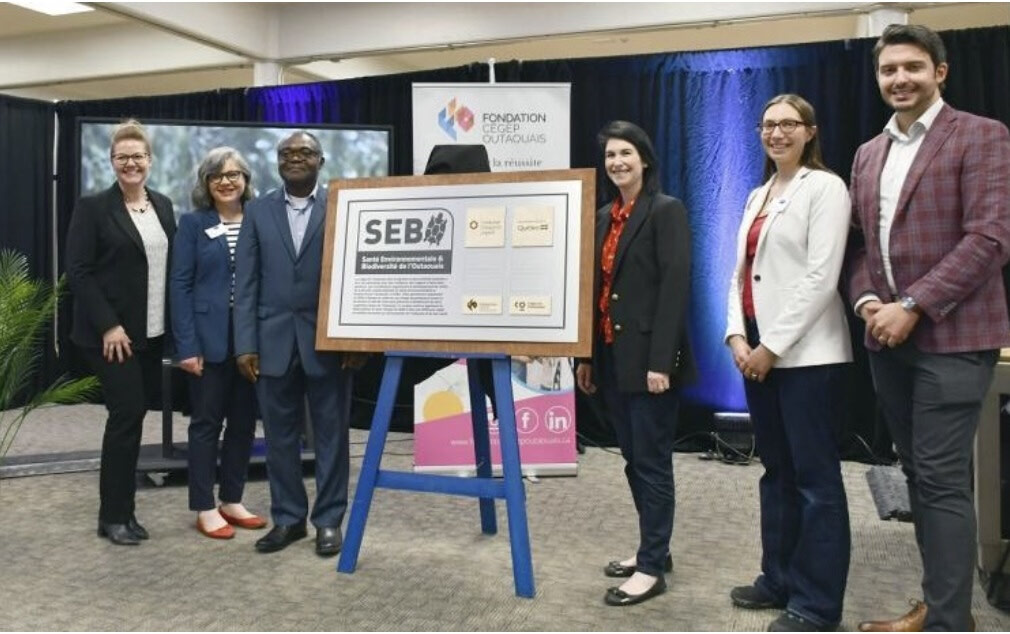
The Outaouais Environmental Health and Biodiversity Research Centre (SEBO) is spearheading a groundbreaking, multi-year effort to combat microplastic pollution in municipal water systems, integrating cutting-edge research, educational opportunities, and municipal collaboration to address a pressing environmental and public health crisis. This initiative is supported by leaders and partners, including Josée Tassé, Stéphanie Pontier, Florent Lado Nogning, Camylle Legault, Catherine Hallé, and Steve Brabant, reflecting a united commitment to innovation and sustainability. Photo: Courtesy of SEBO
Outaouais research centre leads pioneering effort to address microplastic pollution
Tashi Farmilo
The Outaouais Environmental Health and Biodiversity Research Centre (SEBO) at Cégep de l'Outaouais is spearheading an ambitious effort to combat the growing issue of microplastics and nanoplastics in municipal water systems. In partnership with the City of Gatineau, Collège de Maisonneuve’s, Centre d'études des procédés chimiques du Québec (CEPROCQ), and the Université de Montréal, this three-year initiative aims to develop innovative methods to detect and analyse these contaminants. Supported by $437,500 in funding from the Natural Sciences and Engineering Research Council of Canada (NSERC), Mitacs, and the City of Gatineau, the project represents a significant step forward in environmental research.
Emerging contaminants like microplastics pose a serious challenge to ecosystems and public health. By focusing on their presence in municipal drinking water and wastewater, the project seeks to address an urgent issue with far-reaching consequences. Catherine Hallé, a biology teacher and SEBO coordinator, is the principal investigator, working alongside a team that includes Sébastien Sauvé, a professor at the Université de Montréal, and Sanaz Safa, director of CEPROCQ. Together, they aim to align their research with the ambitious objectives of Gatineau’s 2024-2029 Water Management Plan.
“This project reflects our commitment to promoting applied research and addressing critical environmental issues,” said Catherine Hallé. “By collaborating with prestigious partners, we are strengthening not only SEBO’s expertise, but also the training and future of our students.” Students involved in the project will gain invaluable experience through internships supported by Mitacs, while also benefiting from access to the City of Gatineau’s advanced infrastructure.
The project also highlights SEBO’s leadership in coordinating both the scientific and administrative facets of this initiative, further cementing its reputation as a hub for environmental innovation.“This partnership perfectly illustrates the mission of Cégep de l'Outaouais: to offer quality training while actively contributing to significant scientific advances by mobilising partners to meet concrete needs in our communities,” said Steve Brabant, Director General of Cégep de l'Outaouais.
The City of Gatineau views the project as a cornerstone of its water management strategy. “This project represents a significant step forward in our commitment to responsible and sustainable water management, an essential resource for our citizens,” said Marc Bureau, Chair of the Environment and Climate Change Commission and municipal councillor for the Parc-de-la-Montagne-Saint-Raymond district. “By collaborating with renowned research institutions such as SEBO, the City of Gatineau is reaffirming its leadership role in the fight against emerging contaminants and preserving the environment for future generations.”
CEPROCQ Director Sanaz Safa also praised the collaboration, saying, “As a research centre specialising in sustainable development, environmental technologies and processes, we are pleased to leverage our recognised expertise in the field of microplastics to contribute to this innovative project, which addresses major societal issues.”
“This project represents a great opportunity to establish a new research collaboration between SEBO, CEPROCQ, and the Université de Montréal to combat plastic pollution, a growing threat to biodiversity, human health, and ecosystems,” concluded Sébastien Sauvé, professor and expert in environmental mass spectrometry at the Université de Montréal.
